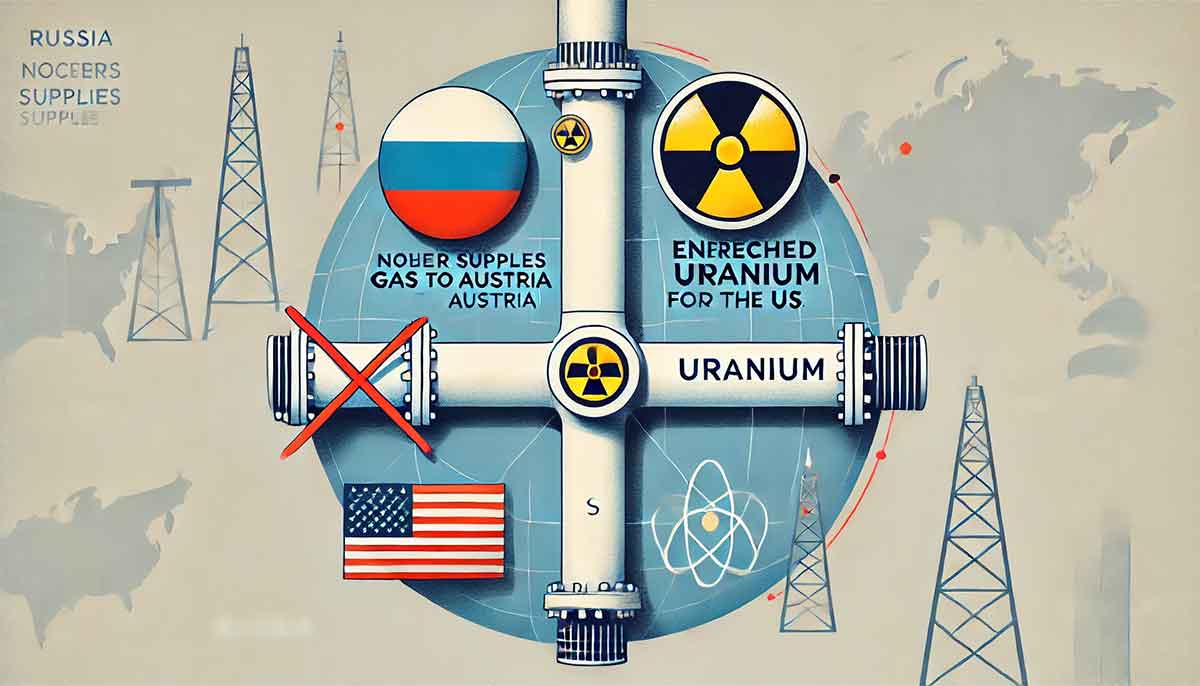Russia has escalated its energy conflict with Europe and the United States by halting gas deliveries to Austria and imposing restrictions on enriched uranium exports to the U.S., marking two significant moves in response to Western sanctions.
Gazprom, Russia’s state-owned gas giant, cut off natural gas supplies to Austria’s largest energy supplier, OMV, on Saturday. This action followed an arbitration ruling awarding €230 million in damages to OMV over Gazprom’s failure to deliver contracted volumes to its German unit. Austria’s energy regulator, E-Control, confirmed that Gazprom deliveries ceased at 6 a.m. local time, although domestic prices and supplies remained stable.
This development highlights a further breakdown in energy relations between Russia and Europe. Once Europe’s largest natural gas supplier, Russia has seen its customer base dwindle dramatically following the EU’s push for energy independence amid the Ukraine war and the 2022 Nord Stream pipeline sabotage. Currently, the Urengoy-Pomary-Uzhgorod pipeline, a Soviet-era gas route via Ukraine, is one of Russia’s last major conduits to Europe. However, this route is also set to shut down by the end of 2023 as Ukraine has declined to renew the transit agreement.
OMV, which typically accounts for 40% of Russian gas flows through Ukraine (approximately 17 million cubic meters per day), is seeking to recover damages by offsetting claims against future payments to Gazprom. Despite the cut-off, Austria assured its citizens of stable supplies, although data from Eustream revealed a 16% drop in volumes directed to Austria via Slovakia.
In a separate move, Russia imposed temporary restrictions on exporting enriched uranium to the United States. This decision, announced Friday, could disrupt the U.S. nuclear power industry, which sourced 27% of its enriched uranium from Russia last year. The restrictions are framed as retaliation against the U.S. ban on Russian uranium imports, introduced earlier this year but with waivers allowing limited shipments through 2027.
Russia’s control over 44% of the world’s uranium enrichment capacity positions it as a critical player in the global nuclear fuel market. The U.S., along with China, has been among the top importers of Russian uranium, with the former importing 313,050 kilograms through July 2023, a 30% decline from the previous year. However, it remains unclear whether the U.S. imported any uranium from Russia after the ban took effect in August.
Moscow’s decree follows a broader directive from President Vladimir Putin in September, urging limitations on exports of uranium, titanium, and nickel as countermeasures against Western sanctions. While authorized Russian firms may still export uranium to the U.S., concerns have emerged over increased uranium imports from China, with allegations that Beijing may be aiding Moscow in circumventing the ban.
Russia’s dual actions underscore the deepening energy and geopolitical divide with the West. The cessation of gas supplies to Austria, a significant player in Europe’s energy network, highlights Europe’s ongoing vulnerability despite efforts to diversify away from Russian resources. Simultaneously, the restrictions on uranium exports to the U.S. threaten to strain the nuclear power sector, raising questions about long-term energy security and supply chains.
These moves reflect Russia’s strategy to leverage its resource dominance as a tool of economic and geopolitical influence, signaling potential further disruptions in global energy markets. Meanwhile, both Europe and the U.S. face the challenge of finding alternative suppliers to mitigate the impact of Moscow’s retaliatory measures, which overcome both with their own resources and by cooperating with other countries..







































